
Share this infographic on your site
(Select the image width and copy the code below it)
Width: 600 pixels
Width: 1200 pixels
How to Become a Fishing Guide Introduction
It has often been stated that the secret to a good life is to do what you love for a living. By turning what would otherwise be a hobby into a career, you find yourself no longer “working” so much as getting paid to do the very thing you love every single day. This greatly eliminates stress and makes life that much more fulfilling.
For anyone who spends most of their free time out on the water, casting and reeling in fish, one of the ways to turn the hobby into a dream job is by becoming a fishing guide. The benefits of becoming a fishing guide are some of the sweetest any angler could imagine: working outside, getting to experience nature close up, spending all day fishing and helping other people not just to learn how to fish, but to love it as much as you do.
How to become a fishing guide is a fairly straightforward process. However, there are some variables depending upon your location and/or where you’ll be working as a professional fishing guide. We’ll answer all key questions on that process and take an in-depth look at the requirements to get you started with living your dream job.
Requirements to be a Fishing Guide
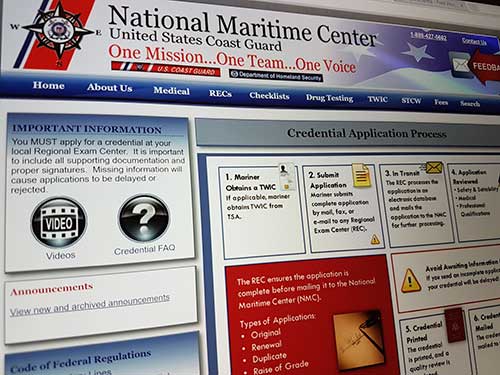
When it comes to understanding how to become a professional fishing guide, the first step is to identify the requirements for the area in which you will be working. There are no federal requirements for being a fishing guide unless you will be taking paying customers on a motorized boat on “federal navigable waterways.” This applies to inland waters, the Great Lakes, and near coastal waters; essentially, if you will take paying customers on a motorized boat onto saltwater or freshwater bodies that lead to the ocean.
If this applies to you, then you must have a Merchant Mariner Credential from the Unites States Coast Guard. The minimal credential they allow is an Operator of Uninspected Passenger Vessel (OUPV,) that lets you carry up to six passengers. Some requirements must be met to attain this credential, more information as well as how to apply can be found on the website for the US Coast Guard.
If you’re going to work as a fishing guide, solely on what are not “federally navigable waterways” (i.e. freshwater that does not connect to the shore or ocean) then the only requirements to be met are those determined by the state, and possibly additional requirements put forth by the Bureau of Land Management (BLM). Generally, the requirements vary from state to state, with some requiring solely that you possess a fishing license, others a fishing guide license as well as first aid and CPR certification, and some that require you to have an outfitter’s license or to be working for one.
Outfitter registration/licensure has its own set of requirements. These are an example and may not be a complete list for all states that require outfitter registration or affiliation in order to be a fishing guide:
To be certain, check with your state’s department of wildlife, or other appropriate governing institution, to be sure that you are keeping with the law.
NOTE: a fishing guide license will have a fee. Some states have a general “guide license” that covers fishing, hunting, and trapping.
Regardless of what the legal obligations may be, there are some general requirements of you as a person that can make a huge difference in your success as a professional fishing guide. While knowing how to catch fish is a great start, as a guide, your primary job will be to help other people catch fish. As a professional fishing guide, you are essentially teaching people how to fish. So, think to yourself what are the traits of a good teacher; these are the qualities you need to possess, to learn, and to emulate.
Being able to communicate clearly and to connect with people will help you reach your maximum potential as a fishing guide. Knowing how to explain something in a few different ways will go a long way with different types of clients. You know how frustrating it is to ask someone to explain what they mean yet they only repeat themselves. The conversation goes nowhere and the only point they made was that they’re insensitive and don’t really care if you understand or not (which may not actually be the case, but that’s what’s implied.) It’s important to be excited about fishing and to convey that excitement to your clients. After all, as a professional fishing guide you should love fishing, right? That’s why you got into this in the first place.
Having a great attitude and being friendly to everyone will carry you much further than developing some inflated ego and thinking you’re the greatest thing out on the water. That sort of attitude will quickly earn you a reputation of being a jerk and will kill your business as it will drive away customers. Remember, your customers are the heart of your business; make sure you like to be around people and that they have a good time.
Professional Fishing Guide Training
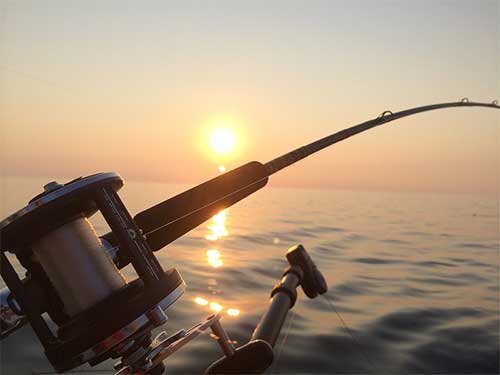
As we saw from looking at the legal requirements to become a professional fishing guide, things vary considerably from state to state. The same can be said about fishing guide training, as there are no set requirements.
That means it is quite possible to learn how to be a fishing guide entirely on your own, based off of your own research, study, and experience.
However, in many states having gone through a respected fishing guide school makes you a more desirable employee for outfitters and resorts. It makes it easier to get hired and fulfill any necessary outfitter registration or affiliation requirements.
Also, many of the fishing guide schools, especially the more reputable ones, will provide you a letter of recommendation and help you with acquiring a job after completing their course.
Independent Study
In states that have no requirements for getting a fishing guide license (or where a fishing guide license is not necessary), it is entirely possible to study on your own to become a professional fishing guide. Of course, the foundation for your study should be on how to fish. You don’t need to be an expert angler, but you do need to be competent with the newest fishing techniques, know how to use standard and the latest fishing gear, and be able to show others how to do things.
From there, it’s important to understand the fish that you will be specializing in, knowing their behavior and biology. But being knowledgeable about the primary species that inhabit the waters you’ll be fishing, in general, will serve you better. This is particularly the case for inland fishing guides taking clients on rivers and lakes where you may be trying for a variety of fish.
It’s also important to be able to spot fish and to be able to read the river or lake that you’ll be fishing. Being certified in CPR and first aid is crucial, as you are responsible for the safety of your clients when they’re with you. It’s also helpful to be skilled in motor repair and maintenance, that way, should any problems arise, you can take care of them immediately and without affecting the comfort of your clients too much.
Fishing Guide Schools
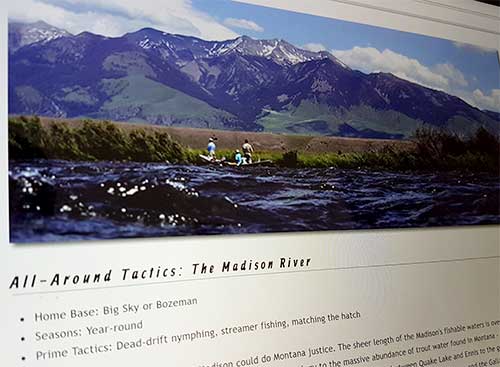
Another option for fishing guide training is to attend a fishing guide school. There are several schools to choose from, with most being based in Colorado, a few in Alaska, and more scattered across the West. Some of these schools are primarily fly fishing guide schools while some also teach techniques and skills relevant to other types of fishing.
The better schools will help you to find a job once you complete their course, providing you a letter of recommendation and a list of outfitters and resorts that are hiring. The duration of the course may be anywhere from four days to two weeks, with tuition costing between $800 and $3400.
Many of the more reputable schools have also been approved to accept tuition via the GI Bill, providing an opportunity for a new career to veterans. Some institutions include the cost of food and lodging, as well as picking you up from the nearest airport. You may or may not be expected to bring your own gear so be sure to check with the school you’ll be attending before packing.
The following is a list of subjects common among fly fishing schools, however, not all schools may cover every subject listed here and may even include other topics:
Depending on the school, there may also be lessons in horsemanship, livestock care, setting up camp, and keeping a clean and hygienic camp.
Fishing Guide Jobs
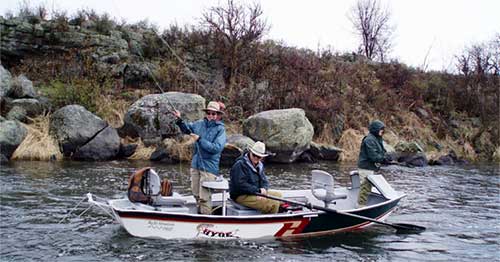
While many people choose to go into business for themselves, others seek fly fishing guide jobs through outfitters and resorts. There are a lot of advantages to being a fishing guide as an employee rather than as a small business owner. For example, there’s no overhead; you don’t have to worry about insurance, no exorbitant startup costs, as all equipment and materials will be supplied for you; etc.
Depending upon where you are located, working for an outfitter may be the only practical option for your fishing guide career. However, working with an outfitter or resort may very well be seasonal work. In some locations, the peak fishing season may be just the summer months, with others perhaps enjoying a late winter and spring season, as well, thanks to warmer temperatures.
Regardless, it is a good idea to line up options for yourself during the offseason to maintain a stable income. One option available to fishing guides in Colorado, for instance, is to work at a ski resort during the winter. You may not be doing work related to fishing, or that you truly have an interest in, but it’s work that keeps your belly filled and a warm roof over your head.
The fly fishing guide job market, specifically, is highly competitive, which means that it is nearly impossible to get a job without having gone to a reputable fishing guide school or without having connections. But you can give yourself an edge over other applicants by making sure that you possess three traits. While it is generally true that younger fishing guides are less likely to be hired by large outfitters and resorts, these qualities will make a difference and prove you to be an exception.
One of the biggest things is to show that you’re mature. You need to show that you can keep your cool when things go wrong and that you can handle the occasional rude or incompetent client (because they will happen; that’s the nature of working in any customer based industry.) You also need to show that you are dependable. Your employer needs to know that you’re actually going to do the job, that you’ll show up, and that you’ll help prepare for the day ahead as well as help clean up at the end of it).
Lastly, you need to show that you have some fishing know-how and that you’re willing and able to convey that knowledge to your clients. You need to demonstrate that you know the latest techniques and how to use the latest equipment. But, you also need to reveal that you are excited and passionate about fishing.
As far as income goes, out West, it’s nothing to make $100 to $200 a day, plus an extra $80 to $100 in tips. That said, you could make more, or less, depending on your location. An average month should see you making about $2,000, including tips.
Becoming your own Boss
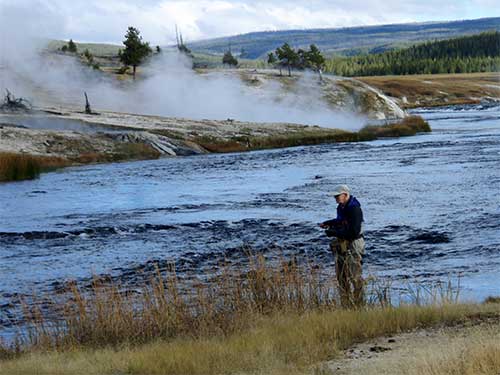
As there are no hard and fast requirements for becoming a professional fishing guide, many people choose to go into business for themselves. This is an excellent way to really take charge of your life, but it doesn’t save you from some of the drawbacks of working for an outfitter, such as a seasonal customer base.
It’s also important to remember that this is a business, and it must be run as such. That means making sure you fulfill all legal requirements for having a small business (which we’ll take a look at below.) It also means that if you are weak in one area of your business, it could prevent you from being out on the water. This will cause your business to suffer.
Successful guides are on the water more than anything; they know what the fish are doing, which increases the catch effectiveness. That translates to happy customers talking about their experience, bringing you more people and growing your business. This is paramount in understanding how to be a fishing guide: be on the water with clients as much as possible and the rest of your business will be much easier. That’s how you make your money, so no making excuses because “something else must be handled.” Nothing can be taken care of if you don’t have the financial means to support your business and your livelihood.
Your personal attitude is huge in determining the success of your business. That point of being friendly to everyone really did mean everyone. You don’t do anyone any favors bad mouthing other people. It reflects badly on you and discourages people from hanging around you.
Other fishing guides in the area should be treated with the same courtesy and respect as you would like. Don’t think of them as competition. As fellow fishermen, they’re your allies and a resource that can benefit you. As a new fishing guide, you can learn a lot from seasoned fishing guides. They may share hard-won knowledge with you or pass on clients should they find themselves overbooked or even give you a heads up on potential problems. You never know.
As a business owner, it’s only natural to expect to put in long hours, and when it comes to getting people out on the water for that perfect early morning fishing, it’s nothing to work a 12 or 16-hour long day. Paired with the seasonal nature of the industry and it’s easy to see why this isn’t a job for everyone.
Lastly, as a small business owner whose business depends on the health of the environment, it’s important to consider environmentally-friendly practices in every step of your business. If the environment is trashed and the fish die, you’re out of a job. So do you part in conservation and be sure that your clients do their part while they’re with you.
Legal Requirements
In addition to meeting the legal requirements to be a professional fishing guide (e.g. fishing guide license, fishing license, outfitter registry, Merchant Mariner Credential, etc.) there are important requirements that you must meet as part of owning your own business. You will need to acquire a business license, which involves incorporation and getting a tax ID.
You also need to get insurance. Not just insurance for your boat and your truck, but for your business and customers. Remember, you are responsible for your clients’ safety when they’re with you, so be sure to cover your butt in the event of a worst-case scenario.
It is also critical to keep careful records of all money coming in and on your expenses. As a business, you will be required to pay taxes on all earned income and will need to show proof of that income and your expenses. Organized record keeping can save you a big headache at tax time.
Basic Business Expenses
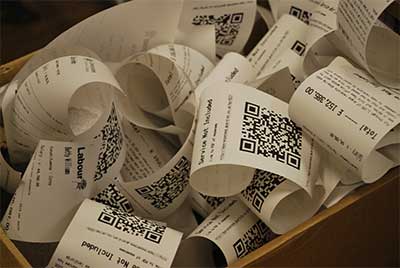
Unfortunately, being a professional fishing guide has a considerable startup cost and isn’t something that you can get around or cut corners on. Trying to save as much money as possible can reflect poorly on your business and make you seem less competent of a guide than you truly are. One way to save money, however, with that initial start-up cost is not to buy something that you wouldn’t personally use.
Most of your customers will have very little to no experience and will wear out equipment faster. Good equipment will last longer, has a warranty, and can be repaired. Handing cheap equipment to a customer can also be insulting as they likely watch fishing shows, read fishing magazines, or linger through fishing supply stores, and are at least aware of what the “good stuff” looks like.
Your basic startup equipment needs:
From there, you can add on with any equipment that you prefer and like to use. When out with clients, you’ll also want to have rain gear on you, a first aid kit, extra water, and some snacks. Of course, if you’ll be camping with your clients, your list of basic startup equipment and things to have on hand will differ dramatically. Use your head and think about what it is you’ll truly need, what you will truly use, and what you’ll wish you had when things go wrong.
Figuring out What to Charge
Assigning monetary value to your services is always a tricky thing to do. It’s natural to feel that you’re asking for too much (because it is a lot of money to you, as it is your income) but you need and deserve to be paid fairly for your time and services. Taking a look at what other fishing guides in the area are charging is a great way to figure out about what you should be fairly charging. However, as a brand new fishing guide, you will need to charge somewhat lower than the median average for your area until you can better establish yourself and your client base.
But, do not charge lower than what it costs you to provide your service as a guide. Your ongoing business expenses and what you provide as part of your service need to be factored into what you charge. This is part of running your business like a business. The money coming in needs to cover all of your expenses, and then there still needs to be some left over to invest in growing your business and, finally, paying yourself.
Attracting Customers
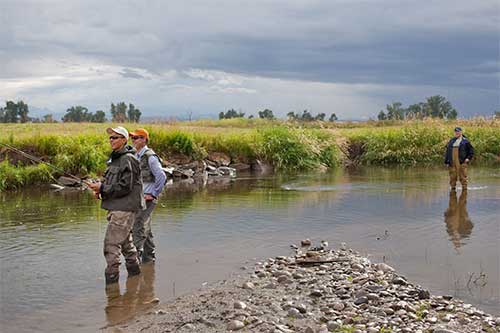
As a new fishing guide, you will need to put in extra effort initially to get your name out there. Running ads in local and regional magazines is an excellent idea, as is putting up flyers in area businesses. For example, local bait shops, fishing supply stores, and marinas are all great places to put flyers. You can also ask area businesses if you can leave a stack of business cards at a checkout for interested people to take. Your effort at being friendly and maintaining a great attitude will come in handy here. It’s also not a bad idea to be on good terms with the owners and/or managers of some local businesses, such as bars, motels and hotels, and bait shops who often get requests about professional fishing guides from out-of-towners. Having established a good relationship with these people betters your chances that they’ll think about recommending you and not somebody else.
It’s also important for you to have a business website. We are living in a time where people will look online to find a service or even a local business more than they will consult any other medium. Having a website so that your business can be found when someone searches for fishing guides in your state is huge! But, it’s not something to stress about. While you can pay to have a professionally made website, you can also make a great-looking site for free and entirely on your own. A quick search for free website platforms should bring up many alternatives that will allow you to create an online presence at virtually no cost. If you’re not very internet savvy, look for a web host that offers simple site building tools such as “what you see is what you get” site building. These are the easiest to use as your website will look just as it does in the editor as it does online (WordPress.com is a good example of such free service).
A basic website should have an about page with information about who you are as a person and as a fishing guide. Take the time to sell yourself, to show why you’re the best guide for the job, and provide some relatable and exciting information about yourself. Be sure to have a page describing exactly what your services include and when they’re available. Your website must also have multiple ways to contact you, such as by phone, email, and a contact form. Most importantly, you should have pictures showcasing the natural beauty of the area where you’ll be taking your clients and pictures of previous happy customers holding the enormous fish they caught thanks to you.
Keeping your Clients Happy
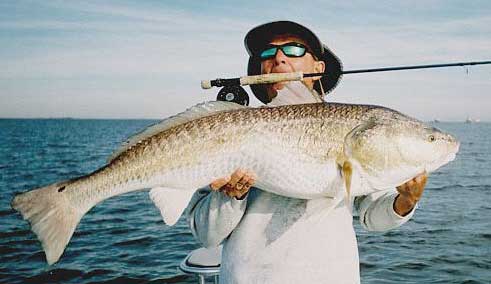
Fishing skills come second to being friendly and able to relate to your customers, as well as treating them with dignity. Happy clients are more likely to become repeat customers and to recommend you to people they know. Consider that hiring a fishing guide is often part of a larger trip and more memorable experience. There’s a good chance that your clients will tell people all about the time they had and how you were as a fishing guide, regardless of whether you did a good job or not -make sure you give your best every time.
Remember that “guiding” doesn’t mean “fishing”. A big part of your job as a guide will be to teach people what to do; to tie knots, choose flies, bait hooks, and show your client where the fish is. Then you’ll likely watch your customer do everything wrong and possibly blame you for it. But that’s just part of the job and why it is so important for you to have that great attitude and maintain your excitement.
Your primary customers will be inexperienced. You’ll likely have mostly family groups and the elderly. Staying upbeat, being encouraging, and keeping your clients motivated will get you much further and make sure that everyone has fun -including you. Things will get broken, rods will be dropped in the water, and someone will fall in -you can’t get discouraged, overly frustrated, and especially not mad. If you can stay positive, not take yourself so seriously, and learn to laugh at things that should be laughed at, you’ll have a much more satisfying career as a fishing guide and your clients will have more fun being around you.
How to become a Fishing Guide – Final thoughts
If you love fishing and can’t imagine anything better than working outside, hanging out with people, and showing them how to do what you love, then there’s a good chance that becoming a professional fishing guide is the perfect job for you. Depending on where you live, you can make a lucrative income year round, though you could choose to work seasonally and maintain another job during the offseason. How you decide to run your business is as variable as how to become a fishing guide, so be sure to do your research, know your options, and follow the law. From there, your only requirement is that you love what you do and that your clients have just as great of a time out on the water as you do.